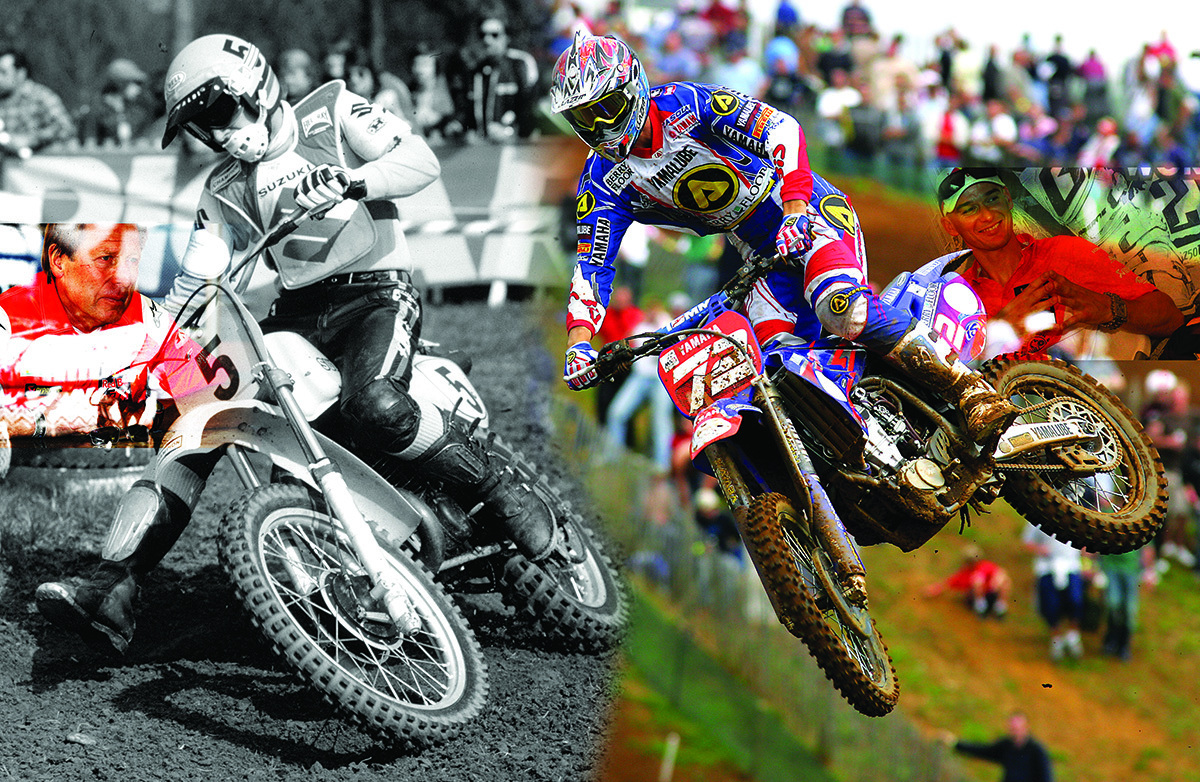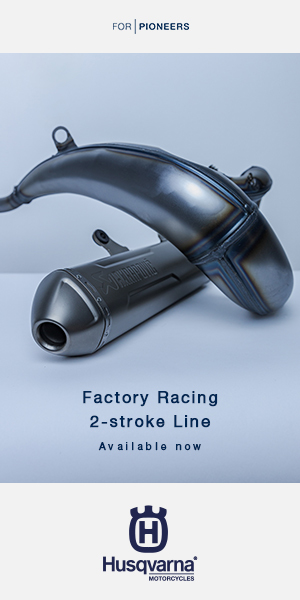De Coster and Everts interview
Posted on August 29, 2023
One of the greatest riders the sport has seen, Roger De Coster turned 79 today and while the legendary Belgian is still heavily involved with the sport, including being the team manager of Team USA for this years Monster Energy Motocross des Nations. As its his birthday, we thought we would pull out this old interview I did with him and Stefan Everts back around 2015.
While attending the Monster Energy United States Grand Prix back a dozen or so years ago, I got to organize an interview with two of the true greats of the sport Roger De Coster and Stefan Everts.
Between them 15 World Motocross Championships and 137 Grand Prix victories, not to mention at the time both are playing leading roles in management of the World effort of the Red Bull KTM Factory team. I would like to take you back to that special day for me.

De Coster and Everts
Just meters to my right was possibly the most charismatic World Motocross Champion of all time Roger De Coster. He was going over some important information with some of the KTM mechanics. A little further away the greatest Grand Prix rider of all time Stefan Everts was talking to his riders, preparing them for the USGP.
Since I was a boy, I had wanted to interview De Coster and while I have done the odd short interview with “The Man” I had never really done anything that would ask him about his career, nothing really in-depth. For whatever reason I always found him to be a little unapproachable and I didn’t want to waste his time with silly little interviews.
On the other hand, Stefan Everts I have known for around 20 years, and while at first, we didn’t have much contact at the peak of his career I penned Stefan Everts columns for magazines and actually became good friends with the GOAT of Grand Prix Motocross.
Now was my chance to sit down with both and ask them questions about each other, their greatest moments and the circuit that inspired them both to unbeatable success.
MEYER: Roger thanks for your time. I am sure you have heard this story a million times, but I remember going to a Motocross race in Australia in 1972 and you were visiting Australia along with Joel Robert, Bengt Aberg and a bunch of other Grand Prix riders. It was one of my first ever Motocross races. It was also around the time that Grand Prix riders visited America and started spreading the word about Motocross to the rest of the World. Did you feel it was your job to expose Motocross to other places apart from Europe?
DE COSTER: You know, I always felt like it was one of my jobs to spread the word about Motocross, to make it more known and to let people know about Motocross in more countries. When I was young, I loved to travel and see other countries and all that. My first big dream was to travel to America and then go to the next place and Australia was one of those places. It was unusual for somebody from Europe to go to Australia, and from Australia you didn’t get too many Australians travelling to Europe. I mean I can remember people like Rod Laver coming to Europe.
MEYER: One of the things I remember was you looking really cool and a bunch of beautiful girls circling you.
DE COSTER: I always liked nice girls.
MEYER: You did introduce many people into the sport, do you ever get tired of hearing people’s stories about you?
DE COSTER: Sometimes, I think hey, I heard that before, what you said, or something somebody else said. It’s kind of nice, because if it means that much to those people, it makes me directly feel good and it means I had something to do with making their interest in the sport bigger Many of these guys are now father and they got their kids into riding and one good thing about Motorcycle racing is that is develops a good relationship with the dad and the kid and without the Motocross being involved that relationship might have been different. There are the hardcore fans, they are sometimes a pain in the butt and they want to talk and talk and talk, but when you think about it those guys are the foundation of our sport, they carry the sport, even in bad days of Motocross those people will still be there.
MEYER: Stefan, do you have similar stories, do people always tell you how they remember you racing back in the early 1990’s?
EVERTS: No, not really. I mean I have more people following me now than when I raced, and I didn’t know it before. When I come to America it’s always nice to realize that a lot of people know what I did in my career, which surprises me. The days from Roger it was more popular, because Motocross came to the US and he was one of the first riders to come here, so he has a lot of people who saw him race a long time ago.
MEYER: You two might be the two best known GP riders in America or not?
EVERTS: I don’t think so, many older guys are still well known in America, a lot of guys who raced the Trans AMA back in the day, even my father raced that, and many people remember my dad. From the new generation they only know about the American riders, which is a pity.
MEYER: Roger, you are known as “The Man”. How do you feel about that nickname being given to you?
DE COSTER: It is still feeling weird, I always felt weird about it, it’s a strange thing. I don’t know how it happened, but the magazines picked up on it and it went from there, and a lot of people started calling me that.
MEYER: Do you ever look in the mirror and say, hey, I am the man?
DE COSTER: I am not the man!!
MEYER: Back in the 1970’s you had massive spectator turn outs for the Grand Prix’s. What was it like to race in front of huge crowds?
DE COSTER: I enjoyed racing in front of a lot of people and I felt it gave me more energy, the more people the more energy. I think very few riders today understand that they can use the crowd to get extra energy. Ken Roczen for such a young kid, he understands that, and he is good at it. Also, Cairoli does that, but many riders overlook that. I think some get nervous from it. I won’t say I wasn’t nervous at the races, but as soon as the race stopped it was gone.
MEYER: Same question to you Stefan.
EVERTS: I also liked a lot of people out there watching me race. The home GP’s I wanted to show how good I was and also at Namur, even when I would get into the car to leave my home I already felt something inside me and then I see the name Namur on the freeway and I see the blood starting to cook and arriving and feeling the atmosphere and hearing the bikes, the echo from the forest.
MEYER: Both yourself and Stefan had a love affair with Namur. Can you tell me a story about that place?
DE COSTER: The first time I went to Namur I rode my bicycle from my house in Brussels. It was like 45 miles and I was 13 years old. My parents didn’t know I did that, it was the year Rene Baeten won the World Championship, it was so exciting, just like Stefan said. I hadn’t travelled much, I didn’t know where the racetrack was, went by the sound, the guys were practicing, and you heard the 4-strokes echoing through the woods and when they shut off it was like a really unique sound. Also, the smell, everyone used Castrol oil and I can still imagine that feeling today, it was some great memories.
MEYER: And then you owned the place for many years.
DE COSTER: Then to race at Namur and to win there, really great memories. After that first visit to Namur I always dreamt I wanted to race there, and then I got to race there and I always thought it couldn’t happen, it’s too big a thing to achieve to win there. One thing told me I could do it, and another thing told me I couldn’t do it. It all happened, and I am very thankful.
MEYER: What made you successful at Namur?
DE COSTER: Namur, it is kind of like Monte Carlo for Formula 1 or Wimbledon for Tennis, it was the kind of place with all the history. Such a different course to what we were used to. Some riders looked at it as a dangerous track, but other riders looked at it as a place where you could make a big difference. If you set-up your bike correctly that could make all the difference. I loved Namur, the feeling and the ambience.
MEYER: Stefan. I remember your first race at Namur when you did the 500cc Grand Prix and Joel (Smets) pleaded with the press not to overplay your victory. You smoked everyone and from that day you had one goal, didn’t you?
EVERTS: Whenever I went to Namur, I had goose bumps for two times 40 minutes, none stop. As for the records, I knew who had the most wins and I knew it was Roger and it was one of my ambitions to break his record, I thought I had broken it, but you just told me he has seven.
DE COSTER: You can’t break all the records Stefan.
EVERTS: For me to win every time I rode there; I won all the races I started in Namur and that was special.
MEYER: Stefan, did you have some questions for Roger?
EVERTS: Yes, I do. My dad was always in a difference class than you, and I wondered how good my dad was when you did get to race against him?
DE COSTER: We raced sometimes. Your dad was always tough. I always thought he was good and competitive; he surprised a lot of people because he wasn’t so assuming in appearance. I think the biggest race we raced in was Orp le Grand, he won it once or twice and I won it and we had to ride three different classes in the one day, and he was the specialist in the 125cc class at the time and I was the top guy in the 500cc class and we swapped bikes, he would ride my 500 and I would ride his 125.
MEYER: As a former racer did you have periods where you saw a rider and thought you would have liked to have raced him? Maybe a Stefan Everts?
DE COSTER: It would have been cool if you could have put the top guys from each generation all today on one day, which would have been really cool. Probably the most impressive race I ever saw Stefan ride, and he had many, was the Motocross des Nations at Foxhills in 1998. We had a lot of rain and Stefan made the other guys look like they were not even in the same class.
MEYER: Was Stefan as good as Ricky (Carmichael)?
DE COSTER: On that day he was way better. I always remember Mitch and I are good friends for a long time, and he was with Ricky and Ricky was on the 125 on that time. And I remember he said to me, Roger, you told me about those Belgian guys, but man they don’t look that good you know. I said to him you think they don’t look that good, you need to look at the lap times. He said no, but look, you keep telling me about Stefan, but he is just riding around slowly, he doesn’t look anything special, he doesn’t even open the throttle. So next lap times Mitch is doing the timing and he keeps swearing and saying he is making a mistake with timing Stefan’s laps, he kept saying this couldn’t be right. Jesus, you sure, I think he is cutting the track somewhere. And in the race Stefan was just on another level all together to the other guys.
MEYER: Stefan, do you have a question for Roger?
EVERTS: I always wondered with the situation now, what are your future plans and the progression of the next few years and what can we do for you at KTM?
DE COSTER: My goal is the same as yours and I really want to win a Supercross title with KTM. That has never happened and obviously we need better riders, but we proved something’s this Supercross season. We made some progress and I think by the end of the outdoors we will have a contender for 2012.
DE COSTER: I have a question for Stefan. When I talked to you about joining our team in America, did you seriously consider, or just say no and that was easy?
EVERTS: No, it wasn’t easy to say no. Since I was a young kid, I had the dream to race in America. I mean I did those Supercross races in 1992 without a lot of success, but it was a good experience and then the offer came unexpected to have Roger on the phone giving me the opportunity to ride for him. If Dave Grant wasn’t there the chance that I had raced in America would have been much bigger.
DE COSTER: I felt that he was the stumbling block. I felt if we didn’t have him between us, I could have convinced Stefan to join us.
MEYER: Would that be the biggest honour you had in your career, having somebody like Roger De Coster saying I believe in you and I want you riding in our team?
EVERTS: For me it was. We had just done the USGP at Budds Creek and I was coming back from my knee injury. I was able to win the first moto at the USGP in an easy way and the second moto I didn’t come through and just missed winning the Grand Prix from Windham. I remember Roger was so impressed with my easy riding. And I remember him saying something like you can teach these guys something still, or something like that.
DE COSTER: I believed in Stefan, you know I believed in the way he rode, and his technique and I think I could have helped him with my working in the US.
EVERTS: Coming back to that question, if I had made that decision to race in America, I might not have won 10 World Motocross Championships, it would have been nice to have one American title on my list, but I got the 10 World titles.
DE COSTER: You know what he did he did really well, and you can’t look back, 10 Championships is something special in the sport.
MEYER: Roger what was your greatest race?
DE COSTER: I think Namur in 1969 (his first win at the famous circuit). I came from last and won the Grand Prix and at that time the track was really narrow, so that was a good one. Also, in Sittendorf one year I lapped up the second place, it was also a mud race.
EVERTS: I have another question for Roger. Will you ever return back to Belgium to live?
DE COSTER: I feel like US is my home now. I don’t feel like I am locked into one country, but I like the climate in America and my body feels better with the warm weather than the cold weather. I will always go back to Belgium as much as possible, go back to visit, but I feel better in California, but I could also live in Australia, I like it there a lot.
EVERTS: How many more years before you go on the pension?
DE COSTER: That sounds funny, I don’t think I can just retire. I think as long as I am still healthy and I can deal with the schedule, then I keep being involved. I love what I do, this isn’t a lot of hours, but it’s like my hobby. I don’t look at it like work, but that is the only way you can work like this.
MEYER: I’ve got a question for you both. Both of you haven’t worked in a real job in your whole life?
DE COSTER: I have actually. After school I worked in a factory in a machine shop for about 18 months before I went into the military, so I know what it is to work, but I did it long enough to realize that racing is great.
Lead image Ray Archer others Geoff Meyer











